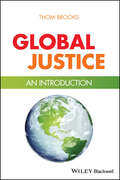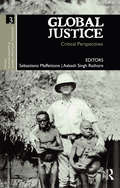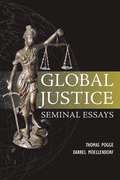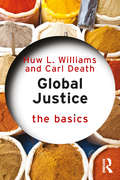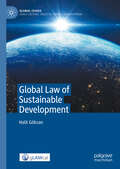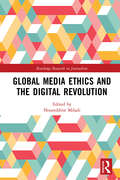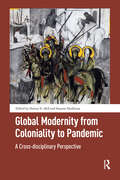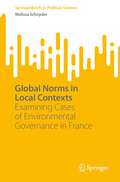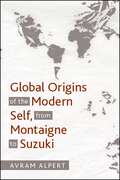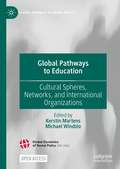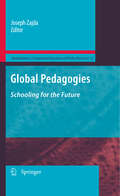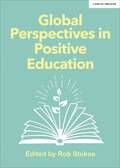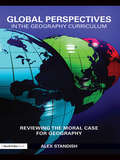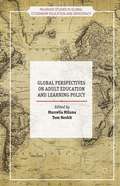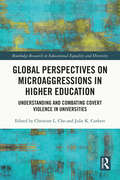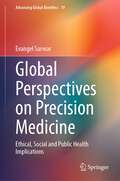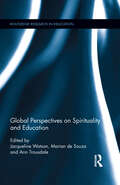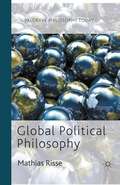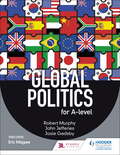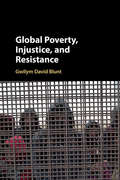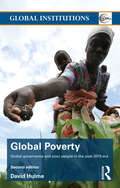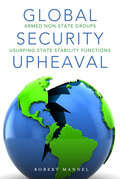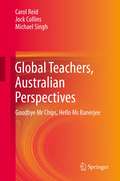- Table View
- List View
Global Justice: An Introduction
by Thom BrooksA fascinating and engaging discussion of the central issues in the contemporary study of global justice In Global Justice: An Introduction, distinguished legal and political philosopher Thom Brooks delivers an authoritative and accessible introduction to foundational concepts in the study of justice that are common to societies around the globe. The author covers fundamental and contemporary concepts, exploring and explaining critical issues, including sovereignty, severe poverty, environmental justice, and human rights. Each chapter explores a unique subject and includes illuminating examples from current affairs around the world, as well as a selection of further reading material that will add depth to reader understanding. Designed to be used as the companion text to The Global Justice Reader, Revised Edition, this book also stands alone as a resource offering expert introductory treatments of the key issues animating contemporary discussion in the field of global justice. Readers will also find: Thorough introductions to sovereignty, the rights to self-determination, human rights, and nationalism and patriotism Comprehensive explorations of cosmopolitanism, immigration and citizenship, and global poverty Practical discussions of the concept of just wars, terrorism, and feminist global justice Extensive treatments of climate change as it relates to the international order and environmental justicePerfect for students of philosophy, politics, political science, and law, Global Justice: An Introduction will be of particular interest to academics and general readers seeking coverage of subjects in international law, jurisprudence, and political and moral philosophy.
Global Justice: Critical Perspectives (Ethics, Human Rights and Global Political Thought)
by Sebastiano Maffettone; Aakash Singh RathoreThe global justice debate has been raging for forty years. Not merely the terms and conditions, but, more deeply, the epistemic, existential and ethical grounds of the international relations of persons, states and institutions are being determined, debated and negotiated. Yet the debate remains essentially a parochial one, confined largely to Western intellectuals and institutional spaces. An Introduction to the field is therefore still urgently required, because it remains necessary to include more ‘global’ voices into this debate of worldwide reach and significance. The book addresses this need in two closely related ways. In Part I, it introduces the main contours of the debate by reproducing three of the most fundamental and influential essays that have been composed on the topic — essays by Peter Singer, Thomas Pogge and Thomas Nagel. In Part II, it makes a decisive critical intervention in the main stream of the debate through exposing the participation deficit afflicting the theorization of global justice. This part begins with a well-known essay by Amartya Sen, who famously referred to the ‘parochialism’ of the global justice debate in making a break with the Rawlsian paradigm that has dominated the field until now. Finally, a series of lively essays newly composed for this volume reflect on the possibilities for deparochializing global justice opened up by Sen’s work in this area. The book will be useful for students of international relations, postcolonial studies, political theory, and social and political philosophy, as well as for those engaged in studies of globalization or global studies.
Global Justice: Seminal Essays
by Thomas Pogge Darrel MoellendorfCarefully selected papers by political philosophers and political theorists on global justice.
Global Justice: The Basics (The Basics)
by Carl Death Huw L. WilliamsGlobal Justice: The Basics is a straightforward and engaging introduction to the theoretical study and practice of global justice. It examines the key political themes and philosophical debates at the heart of the subject, providing a clear outline of the field and exploring: the history of its development the current state of play its ongoing interdisciplinary development. Using case studies from around the world which illustrate the importance of the debates at the heart of global justice, as well as activist campaigns for global justice, the book examines a wide range of theoretical debates from thinkers worldwide, making it ideal for those seeking a balanced introduction to global justice.
Global Law of Sustainable Development (Global Issues)
by Halil GöksanThis book discusses the emergence of a new concept of law at the global level in the field of sustainable development. It examines the four-decade-long evolution of the concept of sustainable development from the Stockholm Conference of 1972 until the adoption of the Sustainable Development Goals in 2015. It brings forward a step-by-step guide for exploring the law-like quality of global norms from a legal positivist and legal pluralist perspective.
Global Media Ethics and the Digital Revolution (Routledge Research in Journalism)
by Noureddine MiladiThis volume responds to the challenges posed by the rapid developments in satellite TV and digital technologies, addressing media ethics from a global perspective to discuss how we can understand journalism practice in its cultural contexts. An international team of contributors draw upon global and non-Western traditions to discuss the philosophical origins of ethics and the tension that exists between media institutions, the media market and political/ideological influencers. The chapters then unveil the discrepancies among international journalists in abiding by the ethics of the profession and the extent to which media ethics are understood and applied in their local context/environment. Arguing that the legitimacy of ethics comes not from the definition per se, but from the extent to which it leads to social good, the book posits this should be the media’s raison d'être to abide by globally accepted ethical norms in order to serve the common good. Taking a truly global approach to the question of media ethics, this volume will be an important resource for scholars and students of journalism, communication studies, media studies, sociology, politics and cultural studies.
Global Modernity from Coloniality to Pandemic: A Cross-disciplinary Perspective
by Hatem N. Akil Simone MaddanuGlobal Modernity from Coloniality to Pandemic explores issues related to the global crises of our time: reason, science, and the environment by revisiting the notions of modernity, modernism, and modernization, which can no longer be considered purely Western or strictly secular. The book poses questions about viewing modernity today from the vantage point of traditionally disparate disciplines – engaging scholars from sociology to science, philosophy to robotics, medicine to visual culture, mathematics to cultural theory, biology to environmental studies. Leading sociologist Alain Touraine contributes a new text in which he reflects on the role of women, refugees and migrants, and the future of democracy. In their conclusion, the editors posit a fundamental ethical distinction between modernization and modernity and call for a new understanding of modernity that is globally distributed, informed by the voices of many, and concerned with crises that threaten all of us at the level of the species – a modernity-to-come. The book presents a global perspective with contributors from Japan, Senegal, Italy, Syria, Sardinia, Turkey, Romania, Kurdistan, France, UK, and USA. It features a new and unpublished contribution by Alain Touraine, imminent sociologist and leading authority on modernity.
Global Norms in Local Contexts: Examining Cases of Environmental Governance in France (SpringerBriefs in Political Science)
by Melissa SchnyderThis Brief discusses the translation of global environmental norms across local contexts in France. It provides a snapshot of how global-level environmental norms travel vertically across levels of governance, from the global to the local, and asks how global environmental norms are (re)interpreted by local-level actors and translated to a particular local context. Chapters focus on three in-depth case studies, each involving multi-stakeholder environmental governance: (1) the Cerbère-Banyuls Marine Nature Reserve, (2) the Thau Fisheries Local Action Group (FLAG), and (3) the Biovallée biodistrict. In each of these cases, the author assesses how twilight norms are used to frame, promote, and generally develop a local discourse that centers on environmental conservation and sustainability. By combining concepts from the literature on norm localization with processes from the literature on norm-based institutional change, this Brief will generate new insights on the dynamic aspects of norm translation. As such, it will be of interest to researchers studying environmental politics, comparative policy, governance, and norms.
Global Origins of the Modern Self, from Montaigne to Suzuki
by Avram AlpertIn Global Origins of the Modern Self, from Montaigne to Suzuki, Avram Alpert contends that scholars have yet to fully grasp the constitutive force of global connections in the making of modern selfhood. Alpert argues that canonical moments of self-making from around the world share a surprising origin in the colonial anthropology of Europeans in the Americas. While most intellectual histories of modernity begin with the Cartesian inward turn, Alpert shows how this turn itself was an evasion of the impact of the colonial encounter. He charts a counter-history of the modern self, tracing lines of influence that stretch from Michel de Montaigne's encounter with the Tupi through the writings of Jean-Jacques Rousseau into German Idealism, American Transcendentalism, postcolonial critique, and modern Zen. Alpert considers an unusually wide range of thinkers, including Kant, Hegel, Fanon, Emerson, Du Bois, Senghor, and Suzuki. This book not only breaks with disciplinary conventions about period and geography but also argues that these conventions obscure our ability to understand the modern condition.
Global Pathways to Education: Cultural Spheres, Networks, and International Organizations (Global Dynamics of Social Policy)
by Kerstin Martens Michael WindzioIn this open access volume, the editors identify the trajectories and patterns displayed by education systems and investigate the causes of change from a global and historical perspective. The contributors argue that the emergence and development of education systems can be traced back to inherent national factors, as well as to the international diffusion of ideas.The research presented in this volume is a wide-ranging analysis and explanation of the dynamics of emergence, diffusion, and change in relation to state education systems. The chapters offer an empirical investigation into whether the global diffusion of Western-rational educational content and organizational forms occurs as expected by neoinstitutionalist theory, or whether culturally specific developmental paths dominate in different parts of the world.The book will be of interest to students and researchers in various social science disciplines, including social policy, education, sociology, political science, international relations, organizational theory, and economics.
Global Pedagogies
by Joseph ZajdaGlobal Pedagogies: Schooling for the Future, which is the twelfth volume in the 12-volume book series Globalisation, Comparative Education and Policy Research, presents scholarly research on major discourses in comparative education research with reference to globalisation, educational policy and classroom pedagogy. It is a sourcebook of ideas for researchers, practitioners and policy makers in education, globalisation, global pedagogies and schooling for the future around the world. The aim of the book is to provide an easily accessible, practical yet scholarly source of information about the international concern in the field of globalisation, global pedagogies, and educational transformation. Readers will find here the very latest thinking on globalisation, global pedagogies and educational transformation in the context of global culture. It offers a timely overview of current issues affecting discourses pertaining to global pedagogies and policy research in the global culture. It provides directions in education, and policy research, relevant to transformational educational reforms in the 21st century. The book critically examines the overall interplay between comparative education discourses, globalisation, and education. It draws upon recent studies in the areas of globalisation, equity, social justice, and the role of the State. It explores conceptual frameworks and methodological approaches applicable in the research covering the State, globalisation, equity, and education. It demonstrates the neo-liberal ideological imperatives of education and policy reforms, and illustrates the way the relationship between the State and education policy affects current models and trends in education reforms and schooling globally. Various book chapters critique the dominant discourses and debates pertaining to comparative education discourses and the newly constructed and re-invented models of neo-liberal ideology in education. Using a number of diverse paradigms in comparative education research, ranging from critical theory to globalisation, the authors, by focusing on globalisation, ideology and democracy, attempt to examine critically both the reasons and outcomes of education reforms, policy change and transformation and provide a more informed critique on the Western-driven models of accountability, quality and school effectiveness. The book draws upon recent studies in the areas of equity, cultural capital and dominant ideologies in education.
Global Perspectives in Positive Education
by Rob StokoeThe common goal of the contributing authors in this publication is to engage, learn from and share success in order to energise the positive education movement for the benefit of our young people. This is the greatest contribution we can make to the future of our global society and the wellbeing of its citizens. We all seek to offer to everyone the potential to achieve success, to be purposeful and content, contributing positively to their own wellbeing and that of others. Presenting at conferences across Australia, Singapore, Dubai and the UK has offered a unique insight in to the breadth and quality of Positive Education globally. The positive education community encompasses a dedicated and selfless group of individuals researchers, practitioners and leaders who are doing great things to help more young people to grow as robust individuals and learners. Yet all too often we fail to join the dots, to connect the passion and expertise of our global community, to share the best of what we do and what we think.Sharing are expertise, passion and enthusiasm is essential if we are to truly support our young people. The International Positive Education Network (IPEN) was established in 204 to promote these values and sharing of insight and expertise. Its mission being to promote academics alongside character and wellbeing, to connect people and to share best practice worldwide.The commitment to these values are exemplified by the writers who have kindly offered their expertise for the good of others, from Dr Helen Street, Australia, to Yukun Zhao in China and Professor Leonid Illushin in Russia. Other chapters have come from Dr. Abdullah Al Karam, KHDA, Dubai, Professor Andrew Martin, Australia and Amba Brown in Singapore.
Global Perspectives in Positive Education
by Rob StokoeThe common goal of the contributing authors in this publication is to engage, learn from and share success in order to energise the positive education movement for the benefit of our young people. This is the greatest contribution we can make to the future of our global society and the wellbeing of its citizens. We all seek to offer to everyone the potential to achieve success, to be purposeful and content, contributing positively to their own wellbeing and that of others. Presenting at conferences across Australia, Singapore, Dubai and the UK has offered a unique insight in to the breadth and quality of Positive Education globally. The positive education community encompasses a dedicated and selfless group of individuals researchers, practitioners and leaders who are doing great things to help more young people to grow as robust individuals and learners. Yet all too often we fail to join the dots, to connect the passion and expertise of our global community, to share the best of what we do and what we think.Sharing are expertise, passion and enthusiasm is essential if we are to truly support our young people. The International Positive Education Network (IPEN) was established in 204 to promote these values and sharing of insight and expertise. Its mission being to promote academics alongside character and wellbeing, to connect people and to share best practice worldwide.The commitment to these values are exemplified by the writers who have kindly offered their expertise for the good of others, from Dr Helen Street, Australia, to Yukun Zhao in China and Professor Leonid Illushin in Russia. Other chapters have come from Dr. Abdullah Al Karam, KHDA, Dubai, Professor Andrew Martin, Australia and Amba Brown in Singapore.
Global Perspectives in the Geography Curriculum: Reviewing the Moral Case for Geography
by Alex Standish‘For geographers across the globe this book provides the arguments for a return to the teaching of geography and why they should reject the politicisation of the subject by education policy makers and politicians. Standish’s careful critique shows the necessity of a depoliticised geography curriculum the irony of which would be that it would ensure that every child could point to Iraq, Iran and Afghanistan on a map.’ Prof. Dennis Hayes – Oxford Brookes University, UK 'A prescient and critical analysis of the changing face of geographyteaching. This book deserves to be widely read and debated. Alex Standish's book puts current trends in geography teaching in historical and critical context. It comprises a forthright and timely defence of geographical education for its own sake.' Dr Jim Butcher, FRSA, Department of Sport Science, Tourism and Leisure, Canterbury Christ Church University. Since the early 1990s, educational policy makers and some subject leaders have been seeking to fundamentally change the teaching of geography in UK and US schools, from a subject which encourages students to explore spatial concepts, ideas and skills, to a more ethics based subject concerned with the promotion of environmentalism, cultural diversity and social justice. In this book the new approach is critically examined, within a historical and ideological context, addressing a number of fundamental questions: Should geography be used as a tool for the delivery of citizenship ideals? How does this affect the intellectual and moral value of geographical education for young people? If the state and teachers are taking more responsibility for the values, attitudes and emotional responses of students, how will they learn to develop these qualities for themselves? If global perspectives shift the focus of education from learning about the outside world to learning about the self, what is its vision of social progress and conception of social change? This book advocates a return to liberal models of education, arguing that the new approach to geography currently being promoted for schools fundamentally undermines the educational value of the subject, and the freedom of young people to shape the world in which they live. A vital resource for teachers and student teachers alike, Global Perspectives in the Geography Curriculum makes a significant contribution to the growing debate about the future direction of the discipline itself.
Global Perspectives on Adult Education and Learning Policy
by Tom Nesbit Marcella MilanaThe worldwide appearance and expression of adult education and lifelong learning have changed significantly during the past 20 years. This book explores recent changes in their related national and international policies, how they intersect with developments in higher education and how they may contribute to debates on citizenship and democracy.
Global Perspectives on Microaggressions in Higher Education: Understanding and Combating Covert Violence in Universities (Routledge Research in Educational Equality and Diversity)
by Christine L. ChoThis book recognizes microaggression as a pervasive issue in colleges and universities around the world and offers critical analyses of the local and institutional contexts in which such incidences of violence and discrimination occur. Authors from Egypt, Barbados, South Africa, Canada, and the United States explore the origins and forms of microaggression which impact students, faculty, and staff in higher education and address issues including xenophobia, sexual violence, linguistic discrimination, and racial prejudice. Drawing on a range of theoretical frameworks and utilizing empirical, qualitative, and ethnographic methods to consider microaggressions perpetrated by both students and staff, each chapter proposes practical ways to prevent violence through education, student agency, policy, and leadership. This book offers a contemporary global dialogue with educators and is vital reading for educators and administrators in higher education.
Global Perspectives on Orhan Pamuk
by Mehnaz M. Afridi David M. BuyzeExplores existential and political themes in Orhan Pamuk's work and investigates the apparent contradictions in an arena where Islam and democracy are often seen as opposing and irreconcilable terms. Existential themes delve into literary nuances in Pamuk that discuss love, happiness, suffering, memory and death.
Global Perspectives on Precision Medicine: Ethical, Social and Public Health Implications (Advancing Global Bioethics #19)
by Evangel SarwarThis book presents the promises of Precision Medicine (PM) and the challenges of its implementation in daily clinical routine, while addressing the anticipated ethical and social implications. It is the first book that critically analyzes the potential and the dilemmas relevant to genomics and precision medicine from healthcare, public health and global perspectives. The nine chapters presented in this book elaborate on pharmacogenomics' crucial role in maximizing the potential benefits and minimizing medication's potential risks in groups of people, especially in cancer treatment and other health conditions. Infectious and non-communicable diseases (NCDs) are also discussed in this book by identifying challenges and ways to overcome them. Essential concepts are addressed, such as health-related benefits and harm to individuals and the broader community, including threats to individual privacy and autonomy, which warrant just distribution of scarce resources. The book also identifies and addresses the lack of competency in the healthcare workforce in the era of PM and discusses the path to laying the ethical foundation for the implementation of PM in healthcare organizations.
Global Perspectives on Spirituality and Education: Global Perspectives On Spirituality And Education (Routledge Research in Education)
by Marian De Souza Jacqueline Watson Ann TrousdaleIn recent decades, and around the world, much attention has been given to the role of spirituality in the education of children and young people. While educationalists share many common goals and values in nurturing the spiritual lives of children and young people, national and regional cultures, religions and politics have impacted on the approaches scholars and practitioners have adopted in their investigations and practices. The different contexts across nations and regions mean that educators face quite distinct conditions in which to frame their approaches to spiritual education and research, and the nature and impact of these differences is not yet understood. This book brings together thinkers from around the globe and sets them the task of explaining how their research on children’s spirituality and education has been shaped by the historical, cultural, religious and political contexts of the geographic region in which they work. The book presents contributions in three sections – Europe and Israel, Australasia, and The Americas– and concludes with a chapter highlighting what is common and what is contextually unique about global approaches to spirituality and education.
Global Political Philosophy
by Mathias RisseThis book focuses on normative questions that arise about globalization. Much social science research is devoted to exploring the political, legal, social and economic changes that occur all around us. This books offers an introductory treatment of the philosophical questions that arise about these changes. Why would people have human rights? We will be looking at different answers to this question. Could there be a universal morality in the first place? This question captures a particular kind of skepticism that has also been applied to the human rights movement and needs to be addresses for the Universal Declaration of Human Rights to be intellectually credible. Ought there to be states? Perhaps there are more appropriate ways of organizing humanity politically. What does distributive justice require at the global level? The world in which we live is one of a striking inequality that challenges us to explore what a just world would look like. What does justice require of us with regard to climate change? We now live in a geological era sometimes called the Athropocene: it is human action that has the biggest impact on the future of all life. How should we think about fairness in trade? Trade, after all, ties people together around the world. And what does justice imply for immigration policy? Each of these questions is answered in its own chapter. Introductions to political philosophy normally focus mostly or entirely on domestic questions. This introduction is concerned with questions of global scope throughout.
Global Politics for A-level
by Robert Murphy John Jefferies Josie GadsbyExpand your students' political thinking and put global politics into context with this brand new textbook; created for the 2017 politics specifications. Combining up-to date commentary and analysis with case studies and features, this textbook will help develop an understanding of politics from the local to the international, revealing how political issues affect us all.- Comprehensive coverage of the latest developments in global politics - Analysis of the perspectives of liberalism and realism- Definitions of key terms and concepts to help clarify knowledge and understanding of political language- Exam focus sections at the end of each chapter to test and develop understanding of key topics, offering practice for short and essay questions
Global Poverty, Injustice, and Resistance
by Gwilym David BluntEach year, millions of people die from poverty-related causes. In this groundbreaking and thought-provoking book, Gwilym David Blunt argues that the only people who will end this injustice are its victims, and that the global poor have the right to resist the causes of poverty. He explores how the right of resistance is used to reframe urgent political questions: is illegal immigration a form of resistance? Can transnational social movements, such as the indigenous rights movement, provide the foundations for civil resistance to global poverty? If peaceful resistance fails, is armed struggle justified? Do people living in affluent states have a responsibility to help even if it requires them to break the law? Giving clear historical examples and engaging with fields including philosophy, international law, history, and international political studies, this volume addresses real-world issues from terrorism to activism. It will be important for anyone interested in applied philosophy and global injustice.
Global Poverty: Global governance and poor people in the Post-2015 Era (Global Institutions)
by David HulmeAround 1.4 billion people presently live in extreme poverty, and yet despite this vast scale, the issue of global poverty had a relatively low international profile until the end of the 20th century. In this important new work, Hulme charts the rise of global poverty as a priority global issue, and its subsequent marginalisation as old themes edged it aside (trade policy and peace-making in regions of geo-political importance) and new issues were added (terrorism, global climate change and access to natural resources). Key updates for the new edition: evaluation of the post-2015 Development Agenda and the Rio+20 exploration of how Colombia and Brazil are pushing a sustainability agenda as a Southern perspective to challenge the aid focus of OECD post-MDGs interests examination and discussion of the gradual shift of power and influence to the BRICs and emerging regional powers (Indonesia, Turkey, South Africa) but the lack of change in global institutions exploration of Russia’s lack of participation in the development agenda The first book to tackle the issue of global poverty through the lens of global institutions; this fully updated volume provides an important resource for all students and scholars of international relations, development studies and international political economy.
Global Security Upheaval: Armed Non-state Groups Usurping State Stability Functions
by Robert MandelThis book calls into question the commonly held contentions that central governments are the most important or even the sole sources of a nation's stability, and that subnational and transnational nonstate forces are a major source of global instability. By assessing recent real-world trends, Mandel reveals that areas exist where it makes little sense to rely on state governments for stability, and that attempts to bolster such governments to promote stability often prove futile. He demonstrates how armed nonstate groups can sometimes provide local stability better than states, and how power-sharing arrangements between states and armed nonstate groups may sometimes be viable. He concludes that these trends in the international setting call for major shifts in our understanding of what constitutes stable governance — proposing that we adopt a fluid "emergent actor" approach. And he calls for significant deviation from standard policy responses to the opportunities and dangers posed by nontraditional sources of national authority.
Global Teachers, Australian Perspectives: Goodbye Mr Chips, Hello Ms Banerjee
by Michael Singh Jock Collins Carol ReidThis is the first book on global teachers and the increasingly important phenomenon of 'brain circulation' in the global teaching profession. A teaching qualification is a passport to an international professional career: the global teacher is found in more and more classrooms around the world today. It is a two-way movement. This book looks at the growing importance of immigrant teachers in western countries today and at teachers who exit from western countries (emigrant teachers) seeking teaching experience in other countries. Drawing on the international literature in Europe, North America, Asia and elsewhere supplemented by rich insights derived from recent Australian research, the book outlines the personal, institutional and structural processes nationally and internationally underlying the increasing global circulation of teachers. It identifies the key drivers of global teacher mobility: a range of factors including family, lifestyle, classroom experience, travel, opportunities for advancement, discipline, linguistic skills, taxation rates, cultural factors and institutional frameworks and policy support. The book is the first detailed contemporary account of the experiences of Australian immigrant and emigrant teachers in the schools and communities where they teach and live. It makes an important and original theoretical and empirical contribution to the contemporary fields of sociology of education and immigration studies.
